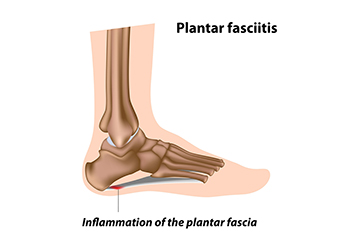Items filtered by date: May 2023
What Is Proper Foot Care for Diabetic Patients?

Maintaining proper foot care is important for diabetic patients. Many people who are diabetic have neuropathy, which is the inability to feel existing cuts or scrapes on the feet. This can be caused by elevated blood sugar levels that can happen from the foods that are eaten. An untreated wound on the foot may lead to incurring a foot ulcer, which is an infected wound. Serious consequences may occur if prompt medical attention is not received. It is beneficial to implement a good diabetic foot care routine daily. It can begin with washing and drying the feet thoroughly, especially between the toes. This can be followed by closely inspecting the bottom of the feet for cuts that cannot be felt. Many people use a mirror to accomplish this, or a family member or caregiver may help to do this. Trimming the toenails once per week may help to prevent an ingrown toenail from developing, which can cause severe pain and discomfort. If you have diabetes, it is strongly suggested that you are under the care of a podiatrist who can help you to manage this condition.
Diabetic foot care is important in preventing foot ailments such as ulcers. If you are suffering from diabetes or have any other concerns about your feet, contact one of our podiatrists from Quad Cities Foot and Ankle Associates. Our doctors can provide the care you need to keep you pain-free and on your feet.
Diabetic Foot Care
Diabetes affects millions of people every year. The condition can damage blood vessels in many parts of the body, especially the feet. Because of this, taking care of your feet is essential if you have diabetes, and having a podiatrist help monitor your foot health is highly recommended.
The Importance of Caring for Your Feet
- Routinely inspect your feet for bruises or sores.
- Wear socks that fit your feet comfortably.
- Wear comfortable shoes that provide adequate support.
Patients with diabetes should have their doctor monitor their blood levels, as blood sugar levels play such a huge role in diabetic care. Monitoring these levels on a regular basis is highly advised.
It is always best to inform your healthcare professional of any concerns you may have regarding your feet, especially for diabetic patients. Early treatment and routine foot examinations are keys to maintaining proper health, especially because severe complications can arise if proper treatment is not applied.
If you have any questions please feel free to contact our offices located in Bettendorf, and DeWitt, IA and Rock Island, IL . We offer the newest diagnostic and treatment technologies for all your foot and ankle needs.
Are You Suffering From Ingrown Toenails?
Plantar Fasciitis and Surgery

The foot condition that is known as plantar fasciitis may require foot surgery to be performed. If other treatment methods are unsuccessful, patients may consider surgery as an option for permanent relief. Plantar fasciitis occurs when the plantar fascia becomes irritated or torn, which may happen from standing on hard surfaces for long periods of time. The plantar fascia is found on the bottom of the foot and connects the heels to the toes. The pain is often felt in the heel and lower leg and can cause difficulty in completing daily activities. Patients that have severe pain with this condition can find it can be uncomfortable to walk, causing them to look for relief options. When surgery is performed, the fascia is detached from the heel bone, and this can be successful in relieving tension. New growth occurs during the healing process, which may lengthen the fascia. If you suffer from this painful condition, it is strongly suggested that you consult with a podiatrist who will help you to determine if foot surgery is right for you.
Foot surgery is sometimes necessary to treat a foot ailment. To learn more, contact one of our podiatrists of Quad Cities Foot and Ankle Associates. Our doctors will assist you with all of your foot and ankle needs.
When Is Surgery Necessary?
Foot and ankle surgery is generally reserved for cases in which less invasive, conservative procedures have failed to alleviate the problem. Some of the cases in which surgery may be necessary include:
- Removing foot deformities like bunions and bone spurs
- Severe arthritis that has caused bone issues
- Cosmetic reconstruction
What Types of Surgery Are There?
The type of surgery you receive will depend on the nature of the problem you have. Some of the possible surgeries include:
- Bunionectomy for painful bunions
- Surgical fusion for realignment of bones
- Neuropathy decompression surgery to treat nerve damage
Benefits of Surgery
Although surgery is usually a last resort, it can provide more complete pain relief compared to non-surgical methods and may allow you to finally resume full activity.
Surgical techniques have also become increasingly sophisticated. Techniques like endoscopic surgery allow for smaller incisions and faster recovery times.
If you have any questions please feel free to contact our offices located in Bettendorf, and DeWitt, IA and Rock Island, IL . We offer the newest diagnostic and treatment technologies for all your foot and ankle needs.
Heel Pain and Plantar Fasciitis

Plantar fasciitis is a common foot condition that can cause debilitating pain. It may compromise the ability to complete daily activities and medical treatment is eventually sought. It is a condition that affects the plantar fascia, which is defined as a band of tissue on the sole of the foot that connects the heels to the toes. An injury can cause the plantar fascia to become irritated or torn, which may happen from running on hard or uneven surfaces. It may also occur from gradual or sudden weight gain, in addition to wearing shoes that do not fit correctly. Some people have a tight Achilles tendon, which connects the calf muscles to the heel. This may result in severe heel pain, which can be a symptom of plantar fasciitis. Patients who have developed this condition may notice the pain is worse in the morning upon arising and the affected foot may be swollen and red. If you are afflicted with plantar fasciitis, it is strongly suggested that you schedule an appointment with a podiatrist as quickly as possible who can offer you effective treatment options.
Plantar fasciitis can be very painful and inconvenient. If you are experiencing heel pain or symptoms of plantar fasciitis, contact one of our podiatrists from Quad Cities Foot and Ankle Associates. Our doctors can provide the care you need to keep you pain-free and on your feet.
What Is Plantar Fasciitis?
Plantar fasciitis is the inflammation of the thick band of tissue that runs along the bottom of your foot, known as the plantar fascia, and causes mild to severe heel pain.
What Causes Plantar Fasciitis?
- Excessive running
- Non-supportive shoes
- Overpronation
- Repeated stretching and tearing of the plantar fascia
How Can It Be Treated?
- Conservative measures – anti-inflammatories, ice packs, stretching exercises, physical therapy, orthotic devices
- Shockwave therapy – sound waves are sent to the affected area to facilitate healing and are usually used for chronic cases of plantar fasciitis
- Surgery – usually only used as a last resort when all else fails. The plantar fascia can be surgically detached from the heel
While very treatable, plantar fasciitis is definitely not something that should be ignored. Especially in severe cases, speaking to your doctor right away is highly recommended to avoid complications and severe heel pain. Your podiatrist can work with you to provide the appropriate treatment options tailored to your condition.
If you have any questions please feel free to contact our offices located in Bettendorf, and DeWitt, IA and Rock Island, IL . We offer the newest diagnostic and treatment technologies for all your foot and ankle needs.
Foot Wound Care

One of the most serious types of wounds on the feet is a foot ulcer. Ulcers can be common among diabetic patients and prompt medical attention is often sought to help prevent an infection. Treatment can begin with removing dead tissue, which is referred to as debridement. This is followed by dressing the wound using sterile gauze pads and antibiotic cream if the wound is infected. Many people who are diabetic can develop neuropathy, the inability to feel existing cuts on the feet. If left unnoticed, a foot ulcer can easily develop and may require more extensive forms of treatment. These types of wounds often take several weeks or months to heal and the dressing may need to be changed daily. If you have diabetes, it is strongly suggested that you speak with a podiatrist who can treat existing wounds and help you manage this condition.
Wound care is an important part in dealing with diabetes. If you have diabetes and a foot wound or would like more information about wound care for diabetics, consult with one of our podiatrists from Quad Cities Foot and Ankle Associates. Our doctors will assess your condition and provide you with quality foot and ankle treatment.
What Is Wound Care?
Wound care is the practice of taking proper care of a wound. This can range from the smallest to the largest of wounds. While everyone can benefit from proper wound care, it is much more important for diabetics. Diabetics often suffer from poor blood circulation which causes wounds to heal much slower than they would in a non-diabetic.
What Is the Importance of Wound Care?
While it may not seem apparent with small ulcers on the foot, for diabetics, any size ulcer can become infected. Diabetics often also suffer from neuropathy, or nerve loss. This means they might not even feel when they have an ulcer on their foot. If the wound becomes severely infected, amputation may be necessary. Therefore, it is of the upmost importance to properly care for any and all foot wounds.
How to Care for Wounds
The best way to care for foot wounds is to prevent them. For diabetics, this means daily inspections of the feet for any signs of abnormalities or ulcers. It is also recommended to see a podiatrist several times a year for a foot inspection. If you do have an ulcer, run the wound under water to clear dirt from the wound; then apply antibiotic ointment to the wound and cover with a bandage. Bandages should be changed daily and keeping pressure off the wound is smart. It is advised to see a podiatrist, who can keep an eye on it.
If you have any questions, please feel free to contact our offices located in Bettendorf, and DeWitt, IA and Rock Island, IL . We offer the newest diagnostic and treatment technologies for all your foot care needs.
Pregnancy and Compression Socks

New mothers often want to ensure that they are doing everything they possibly can to take care of their own health and the health of their new baby. One question that pregnant women sometimes ask medical professionals, such as podiatrists, is what kind of socks they should be wearing while they carry their baby to term. Importantly, it is helpful to note that the answer might depend on each individual patient’s needs. However, generally speaking, wearing compression socks might be helpful for some pregnant women. The reason for this is that they can help in reducing swelling in the feet and lower legs, a common symptom of pregnancy. By wearing compression socks, a pregnant woman may also be able to avoid blood clots, another issue that may arise during pregnancy. If you are pregnant or are planning to be, it is recommended that you contact a podiatrist for advice on how to protect your feet during pregnancy.
Pregnant women with swollen feet can be treated with a variety of different methods that are readily available. For more information about other cures for swollen feet during pregnancy, consult with one of our podiatrists from Quad Cities Foot and Ankle Associates. Our doctors will attend to all of your foot and ankle needs.
What Foot Problems Can Arise During Pregnancy?
One problem that can occur is overpronation, which occurs when the arch of the foot flattens and tends to roll inward. This can cause pain and discomfort in your heels while you’re walking or even just standing up, trying to support your baby.
Another problem is edema, or swelling in the extremities. This often affects the feet during pregnancy but tends to occur in the later stages.
How Can I Keep My Feet Healthy During Pregnancy?
- Wearing orthotics can provide extra support for the feet and help distribute weight evenly
- Minimize the amount of time spent walking barefoot
- Wear shoes with good arch support
- Wear shoes that allow for good circulation to the feet
- Elevate feet if you experience swelling
- Massage your feet
- Get regular, light exercise, such as walking, to promote blood circulation to the feet
If you have any questions please feel free to contact our offices located in Bettendorf, and DeWitt, IA and Rock Island, IL . We offer the newest diagnostic and treatment technologies for all your foot and ankle needs.

